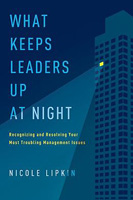This week we are sharing a post from Leading Blog because self-awareness is a hallmark of the Step Up Leader process….
 What Keeps Leaders Up at Night?
What Keeps Leaders Up at Night?
What Keeps Leaders Up at Night? by Nicole Lipkin is a treatise on self-awareness and personal responsibility and the damaging effects a lack of those qualities has in our lives.
“You can’t change what’s already happened, but you can change what you do next.…I’ve learned that the solutions always begin with raising my self-awareness and helping others raise theirs.”
Using research personal examples, Lipkin tackles a number of issues:
I’m a Good Boss. So Why Do I Sometimes Act Like a Bad One?
(You usually find three overarching reasons: too busy to win, too proud to see, and too afraid to lose. “Although most of us don’t like to admit it, we often get all wrapped up in our own ideas, not because we are idiots but because we are human. It’s natural to think our ideas best, especially when we’re the boss.”)
Why Don’t People Heed My Sage Advice?
(If you focus on treating your people with kindness and respect, your influence will grow.)
Why Do I Lose My Cool in Hot Situations?
(“Leaders who want to solve the problems that keep them up at night would be wise to begin with a through inventory of their stress personality.” Learn “how to negotiate your own reactions to the stress that inevitably occurs every day.”)
Why Does a Good Fight Sometimes Turn Bad?
(The emotions underlying a good fight gone bad in the workplace often occur as a result of a dense of injustice, contention for resources or standing, or [I suspect most likely] feelings of inferiority.”)
Why Can Ambition Sabotage Success?
(“The Julius Caesars of the world often end up failing because they pursue myopic success, a ‘nearsighted’ view that defines success in terms of self-interest. The Caesar Augustuses, on the other hand, pursue panoramic success, defining success in terms of the ‘big picture’ best interests of all.”)
Why Do People Resist Change?
(“We find it amazingly easy to turn our backs on compelling reasons to change…Beginning in childhood, we tend to shed habits that don’t serve us well but hang on tightly to those habits that provide us comfort or safety. These persistent habits are able to endure even the most vicious assaults long past their expiration date.”)

